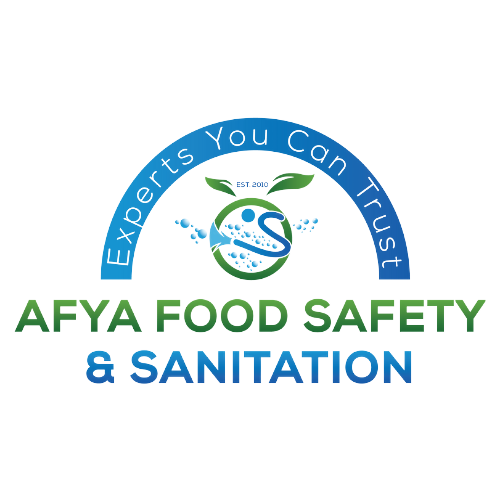
Please Wait For Loading

Please Wait For Loading
Maryland, MD USA
+1 (443) 666-9132
info@afyafoodsafety.com
Opening Hours: 9:00 AM - 5:00 PM
Copyright ©Afya Food Safety all rights reserved.
You can also reach us via Phone: +1 443 666 9132 or via Email:info@afyafoodsafety.com
Understanding and Preventing Foodborne Hazards: 6 safe food handling strategies
Our food, the fuel that keeps us going, can sometimes harbor unexpected dangers – foodborne hazards. These hazards come in various forms, from microscopic bacteria to stray pieces of glass, all with the potential to make us sick. Food safety, therefore, becomes a critical concern.
The Impact of Foodborne Hazards
Foodborne infections can cause everything from minor upset stomachs to serious health problems. Abdominal cramps, nausea, vomiting, and diarrhea are typical symptoms. Severe foodborne illness might result in serious sequelae like renal failure or neurological issues.
Pregnant women, children, the elderly, and those with compromised immune systems are particularly susceptible resulting in healthcare and lost productivity costs to the economy each year.
Minimizing the Threat: Safe Food Handling Strategies
Fortunately, we can reduce the chance of contracting a foodborne illness by using safe food handling practices. The following are some tactics to use:
Beyond the Kitchen: A Shared Responsibility
While consumers have a role in safe food handling at home, ensuring food safety requires a comprehensive approach. Governments have a responsibility to establish regulations and enforce food safety standards. Food producers and manufacturers have to implement strict hygiene and quality control measures throughout the food supply chain.
Investing in traceability systems to track food movement helps in identifying and containing outbreaks quickly. Research and development focused on improved food processing and storage techniques are also vital.
Conclusion: Working Together for Safer Food
Foodborne hazards pose a significant threat to our health and well-being. However, by understanding these hazards and adopting safe food handling practices at home, coupled with robust regulations and industry practices, we can significantly reduce the risk of foodborne illness. By working together, we can ensure the food we eat nourishes us, not harm us.
Guest Post by Rebecca Loice
Related Posts
Categories
Food Safety Insights And Consumer Behavior: Did You Know?
February 24, 20252 Tips To Proper Handling and Cooking of Poultry
February 4, 2025Calender